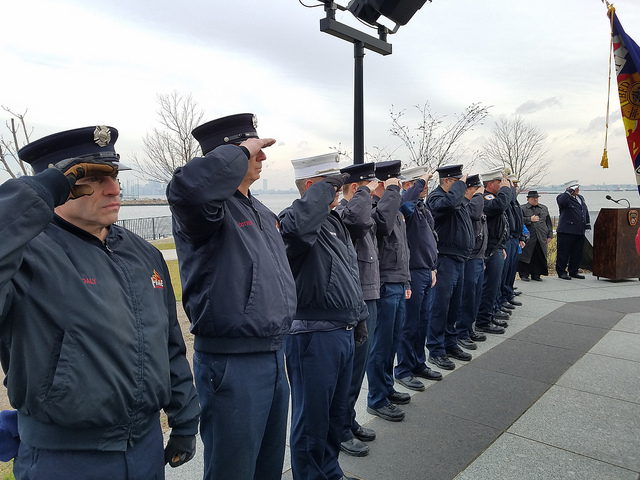This is an edited transcript of an interview conducted January 21, 2022 by Michele Rasmussen, Vice President of the Schiller Institute in Denmark with peace and future researcher and art photographer, Jan Oberg. Prof. Oberg was born in Denmark and lives in Sweden. He has a PhD in sociology and has been a visiting professor in peace and conflict studies in Japan, Spain, Austria, Switzerland, part time over the years. Jan Oberg has written thousands of pages of published articles and several books. He is the co-founder and director of the independent TFF, the Transnational Foundation for Peace and Future Research, in Lund, Sweden since 1985, and has been nominated over several years for the Nobel Peace Prize
Michelle Rasmussen: Hello. I am Michele Rasmussen. Our interview today is with Jan Oberg, and it will have three parts:
First, the danger of war between Russia and Ukraine, which could lead to war between the United States and NATO and Russia, and how to stop it.
Second, your criticism of Denmark’s starting negotiations with the United States on a bilateral security agreement, which could mean permanent stationing of U.S. soldiers and armaments on Danish soil.
And third, your criticism of a major report which alleged that China is committing genocide in Xinjiang province.
A Russian invasion of Ukraine, which some in the West said would start last Wednesday has not occurred. But as we speak, tensions are still very high. You, Jan Oberg, wrote an Jan. 17, called “Ukraine The West has Paved the Road to War with Lies,” specifying three lies concerning the Ukraine crisis. Let’s take them one by one.
Lie Number One
You defined Lie Number One:
1. The West’s leaders never promised Mikhail Gorbachev and his Foreign Minister, Eduard Shevardnadze, not to expand NATO eastward. They also did not state that they would take serious Soviet/Russian security interests around its borders. And, therefore, each of the former Warsaw Pact countries has a right to join NATO, if they decide to freely.
Can you please explain more to our viewers about this lie?
Prof. Jan Oberg: Yes. I would just say about that point that I’m amazed that it is now a kind of repeated truth in Western media, that [Soviet leader] Gorbachev was not given such promises. And it rests, with a few words taken out, on a longer article written years ago by a former U.S. ambassador to Ukraine, who says that Gorbachev did not say so. That article was published by Brookings Institution.
Now the truth is—and there’s a difference between truth and non-truths, and we have to make that more and more clear when we deal with the West at the moment. If you go to the National Security Archives in the U.S., if I remember correctly, at the George Washington University, that is well documented. Their own formulation is that there are cascades of documentation.
However, this was not written down in a treaty, or signed by the West’s leaders, who, one after the other, came to Gorbachev’s dacha outside Moscow or visited him at the Kremlin, and therefore some people would say it’s not valid. Now it is not true in politics, if we can’t rely on what was said and what was written down by people personally in their notebooks, etc.
George Bush, Margaret Thatcher, Helmut Kohl, James Baker III—you can mention almost any important Western leader—were unanimous in saying to Gorbachev, “We understand that the Warsaw Pact has gone, the Soviet Union has gone, and therefore, we are not going to take advantage of your weakness.” James Baker’s formulation, according to all these sources, is “We’re not going to expand Eastward one inch.” And that was said in 1989, 1990. That is 30 years ago. And Gorbachev, because of those assurances—for which he’s been blamed very much ever since–accepted the reunification of Germany.
Some sources say that the deal was that if Germany should be united—which it was very quickly after—it should be a neutral country. But the interpretation in the West was it could remain a member of NATO, but would then include what was at that time the German Democratic Republic, GDR [East Germany] into one Germany.
You can go to the Gorbachev Foundation’s home page and you will find several interviews, videos, whatever, in which he says these things, and you can go to the Danish leading expert in this, Jens Jørgen Nielsen, who has also written that he personally interviewed Gorbachev, in which Gorbachev, with sadness in his eyes, said that he was cheated, or that these promises were broken, whatever the formulation is.
I fail to understand why this is one of the most important reasons behind the present crisis, namely Russia’s putting down its foot, saying, in effect,
You can’t continue this expansion with your troops and your long-range missiles up to the border of Russia. And we will not accept Ukraine [as a member of NATO]. You have gotten 10 former Warsaw Pact countries which are now members of NATO. NATO now has 30 members. We are here with a military budget, which is 8% of NATO’s, and you keep up with this expansion. We are not accepting that expansion to include Ukraine.
Now, this is so fundamental that, of course, it has to be denied by those who are hardliners or hawks, or who cannot live without enemies, or who want a new Cold War, which we already have, in my view, and have had for some years. But that’s a long story. The way the West, and the U.S. in particular—but NATO’s Secretary General [Jens Stoltenberg’s] behavior is outrageous to me, because it’s built on omission of one of the most important historical facts of modern Europe.
Rasmussen: In your article, you quote from Manfred Wörner, the Secretary General of NATO back in 1990, one year before the dissolution of the Soviet Union. In these documents released by the U.S. National Security Archive, that you just referred to, you say:
Manfred Wörner had given a well-regarded speech in Brussels in May 1990, in which he argued: “The principal task of the next decade will be to build a new European security structure, to include the Soviet Union and the Warsaw Pact nations. The Soviet Union will have an important role to play in the construction of such a system.’
And the next year, in the middle of 1991, according to a memorandum from the Russian delegation who met with Wörner, he responded to the Russians by saying that he personally and the North Atlantic Council [the political decision-making body of NATO], were both against expansion, “13 out of 16 NATO members share this point of view,” and “Wörner said that he would speak against Poland’s and Romania’s membership in NATO to those countries leaders, as he had already done with leaders of Hungary and Czechoslovakia. And he emphasized that we should not allow the isolation of U.S.S.R. from the European community,” and this was even while the U.S.S.R. was still alive. It must have been even more the case after the U.S.S.R. collapsed, and Russia emerged.
Prof. Oberg: Well, if I may put in a little point here. Compare the quotation of a former NATO Secretary General, with that from the present Secretary General of NATO. Wörner was a man of intellect. The leaders around him at the time in Europe were too. I mean, those were the days when you had people like Chancellor Willy Brandt in Germany and Östpolitik [Eastern policy], and you had [Prime Minister] Olof Palme in Sweden with common security thinking. We cannot be sure, feel safe and secure in the West, if it’s against Russia. Which does not mean at all to give in to everything Russia does, but it just says we cannot be safe if the others don’t feel safe from us. And that was an intellectualism. That was an empathy, not a necessarily a sympathy, but it was an empathy for those over there, that we have to take into account, when we act. Today that intellectualism is gone completely.
It is very interesting, as you point out, that 13 out of 16 NATO countries, at that time, were at that level, but in came President Bill Clinton in 1990, who basically said—well, he didn’t state it, but he acted as though he had stated it: “I don’t care about those promises,” and started expanding NATO. The first office in Kiev of NATO was set up in 1994. That was the year when he did that. And that was the year I sat in Tbilisi, Georgia, and interviewed the U.S. representative there, who, through a two-hour long conversation, basically talked about Georgia as “our country.”
You know, it’s sad to say it’s human to make mistakes, but to be so anti-intellectual, so anti-empathetic, so imbued with your own thinking and worldview, that you’re not able to take the other side into account, is much more dangerous now than it was at that time, because the leaders we have in the western world today are not up to it. They were earlier, but today’s leaders are not.
Lie Number Two
Rasmussen: Lie Number Two that you pointed out, is:
2. The Ukraine conflict started by Putin’s out-of-the-blue aggression on Ukraine and then annexation of Crimea.
What’s the rest of the story here?
Prof. Oberg: Well, it’s not the rest, it’s the beginning of the story. You see, people who write about these things—and it’s particularly those who are Western media and Western politicians and foreign ministers, etc.—say that it all started with the out-of-the-blue invasion in the Donbas, and then the taking, annexing, aggression on, or whatever the word is, Crimea. Well, they all forget, very conveniently, and very deliberately—I mean, this is not such a longer time ago than people who write about it today wouldn’t know—that there was clearly a Western assisted, if not orchestrated, coup d’état in Kiev in 2014. I won’t go into that long story. After some negotiations about an economic agreement between Ukraine and the EU, in which the president then jumped off, allegedly under pressure from Putin, or whatever, there was a series of violent events in Kiev.
It’s well known from one of those who was there, and participated, namely the Assistant Secretary of State for European Affairs, Mrs. Victoria Nuland. She gave a speech in the U.S. saying, if I remember correctly, that the U.S. has pumped $5 billion into Ukraine over the years, to support democracy and human rights, etc.—and training courses for young NGOs, etc. It’s obvious that that operation, that the ousting of President [Viktor Yanukovich], who had to flee to Russia, and the taking over, partly by neo-Nazis and fascists who were present and who probably did the beginning of the shooting and the killing of people, that all this had to do with the promise that was given to Ukraine years before that it would be integrated into the Euro-Atlantic framework. And then it was kind of stopping and saying, “We don’t want that anyhow. We will negotiate something else, and we will look into what Putin has to offer,” etc.
But that, in Putin’s mind, in Russia’s mind, meant that NATO would be the future of Ukraine. Russia had, still has, a huge military base in Crimea, which it had a lease on for, at the time, I think it was 30-plus years, meaning that should Ukraine, which was clearly signalled out by the western NATO member’s leadership, to enter and become a full member of NATO, Putin would look at a Russian base, either being lost or having a Russian military naval base in a NATO country.
Now I’m not saying that annexing Crimea was a smart move. I’m not saying it was a legal move, but it’s very difficult for the western world to blame Russia for doing it. Look at the opinion polls and the votes for that, if you will, voting themselves back into Russia. Crimea was part of Russia until 1954, when Khrushchev gave it to Ukraine. He was from Ukraine himself. And so, this happened three weeks before. I’m amazed that it should be intellectually possible for people who witnessed this, to somehow forget it, along with the U.S. promise about NATO. There might be some young fools who don’t read history books.
What I’m talking about now is something that happened in 2014, and there’s no excuse for not mentioning that there’s a connection between that coup d’état, and the influence of the West in Ukraine in a very substantial way, and what happened in Donbas and Crimea.
If I put it on a more general level, if we look at today’s ability to understand, describe, analyze issues as conflicts, we are heading for zero understanding. There is nobody in the press and nobody in politics who are able, intellectually, to see these things as conflicts, that is, as a problem standing between two or more parties that has to be analyzed.
Conflict resolution is about finding solutions so that the parties we have defined as parties—and there certainly are many more than two in this very complex conflict—can live with in the future. What we are down to, in banalization, is that there is no conflict. There’s only one party, Russia, that does everything bad and evil and terrible, while we, in the West, are sitting in the receiving end, being the good guys who’ve done nothing wrong in history. We, who could never rethink what we did or say, “We’re sorry,” or change our policies, because we are right.
There’s only one problem. That’s them. In the last three months, we’re down now to the level in which the accusations about Russia invading Ukraine, have nothing to do with conflict analysis. It is focusing purely on one party, and one party, by definition, is not a conflict.
We are not party to a relationship anymore, and that makes a huge difference, again, from the way of thinking and the intellectual approach of the leaders who existed 20-30 years ago. And one reason for all of this is, of course, that the West is on his way down. Second, and they feel threatened by anything that happens around the world. And third, when you have been Number One in a system for a long time, you become lazy. You don’t study. You don’t have as good an education as you should have. You bring up people to high levels who have not read books, because you can get away with everything. You are so strong militarily. And when that happens, it’s a slippery slope and you are actually on board the Titanic.
This is not a defense of everything Russia does. What I’m trying to say is that there is a partner over there. By the way, they call us in the West their partners. We call them anything else but partners. We don’t even see them. We don’t listen to their interests. We didn’t listen to Putin when he spoke at the Munich Security Conference in 2007 and said, “You have cheated us.” And of course, when Gorbachev, 90 years old, says, “You have cheated us,” he’s not even quoted in the Western world, because there’s no space anymore for views other than our own. You know, this autism that is now classical in the Western security policy elite, is damn dangerous.
Lie Number Three
Rasmussen: The third lie you, you pointed out in your cited article, was:
3. NATO always has an open door to new members. It never tries to invite or drag them in, doesn’t seek expansion. It just happens because Eastern European countries since 1989-90 have wanted to join without any pressure from NATO’s side. That also applies to Ukraine.
In this section of your article, you document that Putin actually asked for Russia to join NATO. Can you please explain your most important point about this third lie?
Prof. Oberg: Yeah, well, it’s already there since you quoted my text, but the fascinating thing is that there has not been a referendum in any of these new member states. The fascinating thing is, in 2014, when NATO membership came to its first conflictual situation, in the case of Ukraine, there was not a majority for it, according to any opinion poll in Ukraine. There was not a majority. I would say, it should not be a matter of 51%. If a country is going to join NATO, it should be at least 75 or 80% of the people saying yes to that.
Second—and it’s not something I’ve invented—[Baron George] Robertson, NATO Secretary General from 1999-2004, has told the following story. I think it was first released in The Guardian, but it’s also in a long podcast from a place I don’t remember, which The Guardian quotes. He says that he was asked by Putin whether, or at what time, or whatever the formulation was, NATO would accept Russia as a member.
This probably goes back to what you had already quoted Wörner, NATO Secretary General [from 1988-1994] for having said, namely that a new security structure in Europe would, by necessity, have some kind of involvement, in a direct sense, of Russia, because Russia is also Europe.
And that was what Gorbachev had as an idea: a new [common] European home, something like a security structure where we could deal with our conflicts or differences or misunderstandings, and could still be friends in the larger Europe.
That was why I argued at the time, 30 years ago, that with the demise of the Soviet Union and the Warsaw Pact, the only reasonable thing to do was close down NATO. Instead, as I said, with Clinton and onwards, the whole interpretation was “We have won. The Western system, the neoliberal democratic NATO system has won. We have nothing to learn from that. There’s nothing to change now. We just expand even more.”
And the first thing NATO did, as you know, was a completely illegal. Also, according to its own charter, the invasion, involvement and bombing in Yugoslavia. Yugoslavia was not a member, had never been a member of NATO, and NATO’s only mission is Article 5, which states, in essence, “We are one for all, and all for one. We are going to support some member, if the member is attacked. Now, Article 5 had nothing to do with Yugoslavia. That happened in 1991 and onwards, all through the ’90s. Remember the 72 days of bombings in Kosovo and Serbia. There was no UN mandate for it. But it was a triumphalist interpretation: “We can now get away with everything, anything we want.” We could do it because there was no Russia to take into account. Russia could not do anything about it. China could not do anything about it at the time.
And so, you get into hubris and an inability to see your own limitations, and that is what we are coming up to now. We are seeing the boomerang coming back to NATO, to the Western world for these things.
Of course, some idiots will sit somewhere and say, “Jan Oberg is pro-Russia.” No, I’m trying to stick to what I happen to remember happening at the time. I’m old enough to remember what was said to Gorbachev in those days when the [Berlin] Wall came down and all these things changed fundamentally.
I was not optimistic then that NATO would adapt to that situation; there was hope at that time. There’s no hope today for this, because if you could change, you would have changed long ago. The prediction I make is the United States empire, NATO, will fall apart at some point. The question is how, how dangerous, and how violent that process will be, because it’s not able to conduct reforms or change itself fundamentally into something else, such as a common security organization for Europe.
Solutions
Rasmussen: I want to ask you now about the solutions. You’ve been a peace researcher for many decades. What would it take to peacefully resolve the immediate crisis? And second, how can we create the basis for peaceful world in the future?
You mentioned the idea you had 30 years ago for dismembering NATO. Helga Zepp-LaRouche, the founder and President of the Schiller Institute, has now called for establishing a new security architecture, which would take the interests of all countries, including Russia, into account. So, how could we solve the immediate crisis? If there were the political will, what would have to change among the parties? And secondly, what needs to be done in terms of long-term peaceful cooperation?
Prof. Oberg: The question you are raising is a little bit like the patient who is bleeding to death, who is being operated on by the seventh doctor, and then saying, “What should we do now?” What I have suggested over 30 years is something that should have been done to avoid the situation today, and nobody listened, as is clear, because you don’t listen to researchers anymore who say something else that state-financed researchers do.
It’s not an easy question you are raising, of course. I would say, in the immediate situation, the Minsk Agreements, which have not been upheld, particularly by Ukraine, to establish some kind of autonomy for the Donbas area. That is something we could work with: autonomy solutions. We could work with confederations, we could work with cantonization, if you will. Lots of what happened, and happens, is in the eastern republics of Ukraine.
It reminds me of a country I know very well, and was partly educated in and worked in during its dissolution, namely Yugoslavia. So much so that it resembles Granica. Ukraine and Granica in Croatia, both mean border areas. Granica means border. There’s so much knowledge, wisdom, and lessons learned that could have been a transferred had we had a United Nations mission in that area: A peacekeeping mission, a monitoring mission. UN police and UN civil affairs in the Donbas region.
If I remember correctly, Putin is the only one who suggested that at some point. I don’t think he presented it as a big proposal to the world, but in an interview, he said that was something he could think of. I wrote in 2014, why on Earth has nobody even suggested that the United Nations, the world’s most competent organization in handling conflicts—and, if you will, which put a lid on the military affairs, for instance, by disarming the parties on all sides, which they did in eastern and western Slavonia, in Croatia—not been suggested? Because the western world has driven the United Nations out to the periphery of international politics.
I’ve said Minsk. I’ve said the UN. I’ve said some kind of internal reforms in Ukraine. I have said, and I would insist: NATO must stop its expansion. NATO cannot take the risk, on behalf of Europe, and the world, to say “We insist on continuing with giving weapons to, and finally making Ukraine a NATO member.” You can ask Kissinger, you can ask Brzezinski, you can take the most, if you will, right-wing hawkish politicians in the West. They’ve all said neutrality like Finland or Switzerland, or something like that, is the only viable option.
And is that to be pro-Russian? No, that is what is needed to be pro-Western. I am just looking, like so many others fortunately have done, at the Cuban Missile Crisis. How would the U.S. have reacted, if Russia had a huge military alliance and tried to get Canada or Mexico to become members with long-range weapons standing a few kilometers from the U.S. border?
Do you think the U.S. would have said, “Oh, they were all freely deciding to, so we think it’s OK”? Look at what they did during the Cuban Missile Crisis. They could not accept weapon stations in Cuba.
One of the things you have to ask yourself about, is there one rule and one set of interests for the Western world that does not apply to other actors? If you want to avoid Russia invading Ukraine, which all this nonsense is about, repeatedly now, for two or three months, look into a new status where the East and the West and Ukraine, all of it, can sit down and discuss security guarantees for Ukraine.
President Zelenskyy has said it quite nicely, I must say: “If you don’t want us to become members of NATO,” — and he says that to the West, because he feels that it has taken a long time for the West to act, and he last said that at the Munich Security Conference on Feb. 19. Interesting that a man whose country is going to be invaded any moment, leaves the country and goes to a conference to speak which he could have done on Zoom.
The whole thing doesn’t make sense, like it didn’t make sense on Feb. 16, when all the West said that Russia was going to invade Ukraine, and the Russian Defense Minister was sitting in Damascus and Putin was receiving [Brazilian President Jair] Bolsonaro. I mean, don’t they have intelligence anymore in NATO and Washington?
So, long story short: sit down and give Ukraine the guarantees and sign a non-aggression pact with both sides or all sides, clearly limiting non-nuclear defensive defense measures along the borders, or whatever, and integrate eastern and Western economic organizations.
I would be happy to see Ukraine as part of the Belt and Road Initiative with economic opportunities. There is so much Ukraine could do if it could get out of the role of being a victim, squeezed between the two sides all the time. But that can be done only if the issue is elevated to a higher level, in which Ukraine’s different peoples and different parts and parties are allowed to speak up about what future they want to have in their very specific situation. Ukraine is not just any country in in Europe. It’s a poor country. It’s a country that has a specific history. It’s a country which is very complex, ethnically, language wise, historically, etc.
And that’s why I started out saying confederation. I said something like a Switzerland model, something like Cantonization, or whatever, but for Christ’s sake, give that country and its people a security, a good feeling that nobody’s going to encroach upon them.
And that is to me, the schwerpunkt [main emphasis], the absolutely essential; that is, to give the Ukraine people a feeling of security and safety and stability and peace so that they can develop. I find it very interesting that President Zelenskyy, in this very long interview to the international press a couple of weeks ago, said, and I’m paraphrasing, “I’m tired of all these people who say that we are going to be invaded because it destroys our economy. People are leaving. No business is coming in, right?”
Who are we to do this damage to Ukraine and then want it to become a member of NATO? You know, the whole thing is recklessly irresponsible, in my view, particularly with a view of Ukraine and its peoples and their needs. I would put that in focus, and then put in a huge UN peacekeeping mission and continue and expand the excellent OSCE [Organization for Economic Cooperation and Development] mission. Put the international community—good hearted, neutral people—down there and diffuse those who have only one eyesight, only one view of all this. They are the dangerous people.
A New Security Architecture
Rasmussen: And what about the more long-term idea of a new security architecture in general?
Prof. Oberg: Oh, I would build a kind of, I wouldn’t say copy of, but I would build something inspired by the United Nations Security Council: All Europe, representatives from all countries, including NGOs, and not just government representatives. I would have an early warning mechanism where the moment there is something like a conflict coming up, we would have reporters and we would have investigations we would look into it, not conflict prevention.
My goodness, people don’t read books. There’s nothing about conflict prevention. We should prevent violence. We should prevent violent conflict, but preventing conflicts is nonsense, life is getting richer. There’s not a family, there’s not a school, there’s not a workplace, there’s not a political party, there’s not a parliament in which there are no conflicts. Conflict is what life is made of. Conflict is terribly important because it makes us change and reflect. I’m all for conflicts, but I’m 110% against violence. People will say, “Conflict prevention is something we should work, on and educate people in.” Nonsense, from people who never read books, as I said.
I would look for something like common security. The good old Palme Commission from the ’80s, which built on defensive defense. The idea that according to Article 51, in the UN Charter, every nation has a right to self-defense.
But nations do not have a right to missiles that can go 4,000 km or 8,000 km and kill millions of people far away. Get rid of nuclear weapons and all these things. They have nothing to do with defensiveness and common security. Wherever I go and whoever I speak to, I say, “Get rid of nuclear weapons and offensive long-range weapons.”
The only legitimate weapons there are in this world are defensive ones, and they are defined by two things. Short distance, that is, the ability to go only over a short distance, such as helicopters instead of fighter airplanes or missiles.
And second, limited destructive capacity because they’re going to be used on one’s own territory in case somebody encroaches or invades you. Nobody wants to have nuclear weapons or totally super destructive weapons on their own territory because they don’t want them to be used to there. So just ask yourself, what would you like in Country X, Y and Z to be defended with? And that’s a definition of a defensive weapons. If we all had only defensive military structures, there would be very few wars, but they would also not be a military-industrial-media-academic complex that earns its money on this.
The big elephant in the room we are talking about is, well, there are two of them: one is NATO expansion, which we should never have done this way. And second, the interest of the military-industrial-media-academic complex, as I call it, that earns a hell of a lot of money on people’s suffering. Millions of people at this moment while we speak, are living in fear and despair because of what they see in the media is going to happen. None of what we see at this moment was necessary. It’s all made up by elites who have an interest in these kinds of things happening or the threat of the Cold War. And even if we avoid a big war now, and I hope, I don’t pray to anything, but I hope very much that we do, thanks to some people’s wisdom, and it’s going to be very cold in Europe in the future after this.
Look at the demonization that the West has done again against Russia, and to a certain extent, of Ukraine. This is not psychologically something that will be repaired in two weeks.
Rasmussen: And also, as you mentioned at the beginning, it has also something to do with the unwillingness in part of certain of the Western elites to accept that we do not have an Anglo-American unipolar world, but that there are other countries that need to be listened to and respected.
Prof. Oberg: You might add, what the West gets out of this is that Russia and China will get closer and closer. You are already seeing that in the Joint Statement of Feb. 4: “We will have friendship eternally.” And that’s between two countries who up to the ’60s at some point were very strong enemies. And the same will go with Iran, and there will be other countries like Serbia which are turning away from the West. We’re going to sit and be isolating ourselves because, one, we in the West cannot bully the world anymore, as we could before. And second, nobody wants to be bullied anymore. We have to live in a world in which there are different systems. The Christian missionary idea that everybody must become like us, where we opened up to China because we hoped they would become liberal democracies with many parties, and a parliament, is awfully naïve. Time is over for that kind of thinking.
The U.S.-Denmark Defense Cooperation Agreement
Rasmussen: I want to go into the other two subjects. First, the negotiations between Denmark and the United States in the context of the political, military and media statements of recent years, alleging that Russia has aggressive intentions against Europe and the U.S. The Danish Social Democratic government announced Feb. 10 that a year ago the U.S. requested negotiations on a Defense Cooperation Agreement, and that Denmark was now ready to start these negotiations. The government announced that it could mean permanent stationing of U.S. troops and armaments on Danish soil. This would be against the decades-long policy of the Danish government not to allow foreign troops or armaments to be permanently stationed in Denmark. You wrote an article two days later criticizing these negotiations. Why are you against this?
Prof. Oberg: I’m against it because it’s a break of 70 years of sensible policies. We do not accept foreign weapons and we do not accept foreign troops, and we do not accept nuclear weapons stationed on Danish soil. I sat, for ten years, all throughout the 1980s, in the Danish Governments Commission for Security and Disarmament as an expert. Nobody in the ’80s would have mentioned anything like this.
I guess the whole thing is something that had begun to go mad around 20 years ago, when Denmark engaged and became a bomber nation for the first time, in Yugoslavia. And then Afghanistan and Iraq. It means that you cannot say “No.” This is an offer you can’t refuse. You can’t refuse it, among other things—it’s my interpretation—because—you remember the story where President Trump suggested that he or the U.S. could buy Greenland, and the Prime Minister Mette Frederiksen said, “Well, that is not something to be discussed. The question is absurd,” after which he got very angry. He got personally very angry, and he said, ‘It’s not a matter of speaking to me. You’re speaking to the United States of America.”
I think this offer to begin negotiations must have come relatively shortly after that, as “This offer is not something you should call absurd once again.” I’ve no evidence for that. But if these negotiations started more than a year ago, we are back in the Trump administration.
Second, what kind of democracy is that? We do not know when that letter was written, or its contents, in which the Americans asked to have negotiations about this. But what we do hear, is that a little more than a year ago, we began some negotiations about this whole thing behind the back of Parliament, and behind the back of the people, and then it is presented more or less as a fait accompli. There will be an agreement. The question is only nitty-gritty as to what will be in it.
In terms of substance, there is no doubt that any place where there would be an American facilities, or whenever you’d call them, weapons stored, which will be the first targets in a war, seen as such in a war, under the best circumstances, seen by Russia. Russia’s first targets will be to eliminate the Americans everywhere they can in Europe, because those are the strongest and most dangerous forces.
Second, it is not true that there is a “no to nuclear weapons” in other senses than Denmark will keep up the principle that we will not have them stationed, permanently. But with such an agreement, where the Air Force, Navy and soldiers, military, shall more frequently work with, come in to visit, etc., there’s no doubt that there will be more nuclear weapons coming in, for instance, on American vessels than before, because the cooperation would get closer and closer.
The only thing the Danish government will be able to do is, since they know that under the “neither confirm nor deny policy” of the U.S., they would not even ask the question, if they asked by journalists, they would say, “Well, we take for granted that the Americans honor or understand and respect that we do not have nuclear weapons on Danish territory, sea territory,” or whatever. Now the Americans are violating that in Japan even. So, this is nonsense. There would be more nuclear weapons. I’m not saying they would go off or anything like that. I’m just saying there would be more undermining of Danish principles.
The whole thing, of course, has to do with the fact that Denmark is placing—and that was something the present government under Mette Frederiksen’s leadership did before this was made public—110% of its eggs in the U.S. basket. This is the most foolish thing you can do, given how the world is changing. The best thing a small country can do is to uphold international law and the UN. Denmark doesn’t. It speaks like the U.S. for an international rules-based order, which is the opposite of, or very far away from the international law.
Third, in a world where you are going to want multipolarity, a stronger Asia, a stronger Africa, another Russia from the one we have known the last 30 years, etc., and a United States that is, on all indicators except the military, declining and will fall as the world leader. This is, in my view — be careful with my words — the most foolish thing you can do at the moment, if you are a leader of Denmark, or if you are leading the Danish security policies.
You should be open—I wrote an article about that in a small Danish book some six or seven years ago, and said “Walk on two legs.” Remain friendly with the United States and NATO, and all that, but develop your other leg, so you can walk on two legs in the next 20, 30, 40 years. But there’s nobody that thinks so long-term in the Ministry of Foreign Affairs, and there’s nobody who thinks independently anymore in research institutes or ministries. It’s basically adapting to everything we think, or are told by Washington we should do. That’s not foreign policy to me. There’s nothing to do with it.
A good foreign policy is one where you have a good capacity to analyze the world, do scenarios, discuss which way to go, pros and contras, and different types of futures, and then make a decision in your parliament based on a public discussion. That was what we did early, ’60s, ’70s, and ’80s. When you become a bomber nation, when you become a militaristic nation, when active foreign policy means nothing but militarily active, then, of course, you are getting closer and closer and closer down into the into the darkness of the hole, where suddenly you fall so deeply you cannot see the daylight.
I think it’s very sad. I find it tragic. I find it very dangerous. I find that Denmark will be a much less free country in the future by doing these kinds of things. I don’t look at this agreement as an isolated thing. It comes with all the things we’ve done, all the wars Denmark has participated in. Sorry, I said we, I don’t feel Danish anymore, so I should say Denmark or the Danes. And finally, I have a problem with democratically elected leaders who seem to be more loyal to a foreign government, than with their own people’s needs.
China and Xinjiang
Rasmussen: You just mentioned the lack of independence of analysis. There’s not only an enemy image being painted against Russia, but also against China, with allegations of central government genocide against the Muslim Uyghur minority in Xinjiang Province as a major point of contention.
On March 8, 2021, the Newlines Institute for Strategy and Policy in Washington published a The Uyghur Genocide: An Examination of China’s Breaches of the 1948 Genocide Convention, in cooperation with the Raoul Wallenberg Center for Human Rights in Montreal. The following month, on April 27, you and two others issued a report criticizing the Newlines Institute report. What is the basis of your criticism, and what do you think should be done to lessen tension with China?
And also, as a wrap-up question, if you wanted to say anything else about what has to be done to make a change from looking at Russia and China as the autocratic enemies of the West, and instead shift to a world in which there is cooperation between the major powers, which would give us the possibility of concentrating on such great task as economic development of the poorer parts of the world?
Prof. Oberg: Well, of course, that’s something we could speak another hour about. Our tiny think tank, the Transnational Foundation for Peace & Future Research (TFF), by the way, is totally independent and people-financed and all volunteer. That’s why we can say and do what we think should be said and done. Not politically in anybody’s hands or pockets, we can say that the Newlines Institute’s report and other similar reports do not hold water, would not pass as a paper for a master’s degree in social science or political science.
We say that if you look into not only that report, but several other reports and researchers who contribute to this genocide discussion, if you look into their work, they are very often related to the military-industrial-media-academic complex. And they are paid for, have formerly had positions somewhere else in that system, or are known for having hawkish views on China, Russia and everybody else outside the western sphere.
When we began to look into this, we also began to see a trend. And that’s why we published shortly after a 150-page Behind the Smokescreen: An Analysis of the West’s Destructive China Cold War Agenda and Why it Must Stop, about the new Cold War on China, and Xinjiang is part of a much larger orchestrated—and I’m not a conspiracy theorist, it’s all documented, in contrast to media and other research reports. It’s documented. You can see where we get our knowledge from, and on which basis we draw conclusions.
Disappearance of Scholarship
Whereas now, significantly, for Western scholarship and media, they don’t deal with, are not interested in sources. I’ll come back to that. It’s part of a much larger, only-tell-negative-stories about China; don’t be interested in China’s new social model. Don’t be interested in how in 30-40 years they did what nobody else in humankind has ever done: Uplifted hundreds of millions of people out of poverty and created a society that I can see the difference from when I visited China in 1983. I know what it looked like back then when they had just opened up, so to speak.
What we are saying is not that we know what happened and happens in Xinjiang, because we’ve not been there and we are not a human rights organization. We are a conflict resolution and peace proposal making policy think tank. But what we do say is, if you cannot come up with better arguments and more decent documentation, then probably you are not honest. If there’s nothing more you can show us to prove that there’s a genocide going on at Xinjiang, you should perhaps do your homework before you make these assertions and accusations.
That’s what we are saying, and we are also saying that it is peculiar that the last thing Mike Pompeo, Trump’s Secretary of State, did in his office, on Jan. 19, 2021 was to say “I hereby declare that Xinjiang is a genocide.” The State Department has still not published as much as one A4 [world standard for letter paper, slightly longer than the U.S. 8-1/2 x 11] page with the documentation.
I feel sad on a completely different level, and that is, Western scholarship is disappearing in this field. And those who may really have different views and analyses, and question what we hear or uphold—a plurality of viewpoints and interpretations of the world—we’re not listened to. I mean, I’m listened to elsewhere, but I’m not listened to in Western media, although I have 45 years of experience in these things and I’ve traveled quite a lot and worked in quite a lot of conflict and war zones. I can live with that, but I think it’s a pity for the Western world that we are now so far down the drain, that good scholarship is not what politics is built on anymore. If it ever was, I think it was at a distant point in time.
Also striking to me is the uniformity of the press. The day that the Newlines report that you referred to, was published, it was all over the place, including front pages of the leading Western newspapers, including the Danish Broadcasting’s website, etc.—all saying the same thing, quoting the same bits of parts.
The uniformity of this is just mind boggling. How come nobody said, “Hey, what is this Newlines Institute, by the way, that nobody had heard about before? Who are these people behind it? Who are the authors?” Anybody can sit in their chair and do quite a lot of research, which was impossible to do 20 years ago. If you are curious, if you are asked to be curious, if you are permitted to be curious, and do research in the media, in the editorial office where you are sitting, then you would find out lots of this here is B.S. Sorry to say so, intellectually, it’s B.S.
And so, I made a little pastime. I wrote a very diplomatic letter to people at CNN, BBC, Reuters, etc. Danish and Norwegian, and Swedish media, those who write this opinion journalism about Xinjiang, and a couple of other things, and I sent them all our report, which is online, so it’s just a click away, and I said “Kindly read this one, and I look forward to hearing from you.” I’ve done this in about 50 or 60 cases, individually dug up their email addresses, etc. Not one has responded. The strategy when you lie, or when you deceive, or when you have a political man, is don’t go into any dialogue with somebody who knows more or it’s critical of what you do.
That’s very sad. Our TFF Pressinfo goes to 20 people at the BBC. They know everything we write about Ukraine, about China, about Xinjiang, etc. Not one has ever called.
These are the kinds of things that make me scared as an intellectual. One thing is what happens out in the world. That’s bad enough. But when I begin to find out how this is going on, how it is manipulated internally in editorial offices, close to foreign ministries, etc. or defense ministries, then I say, we are approaching the Pravda moment. The Pravda moment is not the present Pravda [newspaper], but the Pravda that went down with the Soviet Union. When I visited Russia (the Soviet Union at the time) for conferences, etc., I found out that very few people believed anything they saw in the media. Now, to me, it’s a question of whether the Western media, so-called free media, want to save themselves, or do they want to become totally irrelevant, because at some point, as someone once said, “You cannot lie all the time to all of the people, you may get away with lying to some, to some people, for some of the time.”
Rasmussen: President Lincoln.
Prof. Oberg: Yeah. The long story short, is that this is not good. This deceives people. And of course, some people, at some point, will be very upset about that. They have been lied to. And also, don’t make reference anymore to the so-called difference between free and state media.
Viewers may like to hear it, may not like it, but should know this: the U.S. has just passed a law—they have three laws against China—intervening in all kinds of Chinese things, such as, for instance, trying to influence who will become the successor to Dalai Lama, and things like that. They are not finished at all about how to influence Taiwan, and all that—things they have nothing to do with, and which were decided between President Richard Nixon and Premier Zhou Enlai, that America accepted the One-China policy and would not mix themselves into Taiwanese issues. But that is another broken promise. These so-called free media are actually state media in the U.S.
Take Radio Free Europe and Radio Free Asia. they both, particularly the latter, have disseminated most of these Xinjiang genocide stories, which then bounce back to BBC, etc. These are state media. As an agency for that in in Washington, it’s financed by millions of dollars, of course, and it has the mandate to make American foreign policy more understood, and promote U.S. foreign policy goals and views. Anybody can go to a website and see this. Again, I’m back to this, everybody can do what I’ve done.
That law that has just been passed says the U.S. sets aside $1.5 billion in the next 5 years, to support education, training courses, whatever, for media people to write negative stories about China, particularly the Belt and Road Initiative. I look forward to Politiken [Danish newspaper] or Dagens Nyheter [Swedish newspaper] or whatever newspapers in the allied countries who would say, “This comes from a U.S. state media,” when it actually does.
And so, my view is that there is a reason for calling it the military-industrial-media-academic complex, because it’s one cluster of elites who are now running the deception, but also the wars that are built on deception. And that is very sad where, instead, we should cooperate. I would not even say we should morally cooperate. I would say we have no choice on this Earth but to cooperate, because if we have a new Cold War between China and the West, we cannot solve humanity’s problems, whether it’s the climate issue, environmental issues, poverty, justice, income differences or cleavages, or modern technological problems, whatever. All these things are, by definition, global. We have one former empire, a soon to be former empire, that does nothing but disseminate negative energy, criticize, demonize, running cold wars, basically isolating itself and going down.
The U.S. Is Needed to Contribute to a Better World
We lack America doing good things. I’ve never been anti-American. I want to say that very clearly. I’ve never, ever been anti-American. I’m anti-empire and anti-militarism. We need the United States, with its creativity, with its possibilities, with what it already has given the world, to contribute constructively to a better world, together with the Russians, together with Europe, together with Africa, together with everybody else, and China, and stop this idea that we can only work with those who are like us, because if that’s what you want to do, you will have fewer and fewer to work with.
The world is going toward diversity. Other cultures are coming up who have other ways of doing things. We may like it or not. The beauty of conflict resolution and peace is to do it with those who are different from you. It is not to make peace with those who already love you, or are already completely identical with you. Conflict and peace illiteracy, unfortunately, has now completely overtaken the western world. Whereas, I see people thinking about peace, and I hear people mentioning the word peace, I do not hear Western politicians or media anymore mention the word peace. And when that word is not there, and the discussion and the discourse has disappeared about peace, we are very far out.
Combine that with lack of intellectualism and an analytical capacity, and you will end up in militarism and war. You cannot forget these things and avoid a war. In my view, there are reasons other than Russia, if you will, why we’re in a dangerous situation, and that danger has to do with the way the West itself is operating at the moment. Nobody in the world is threatening the United States or the West. If it goes down, it’s all of its own making. I think that’s an important thing to say in these days when we always blame somebody else for our problems. That is not the truth.
Rasmussen: Thank you so much, Jan Oberg.


















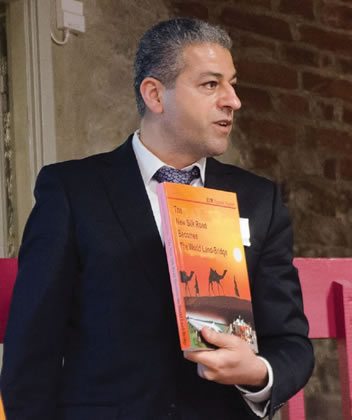
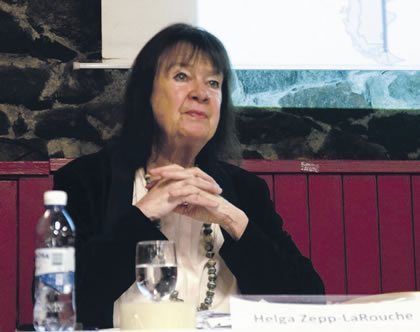
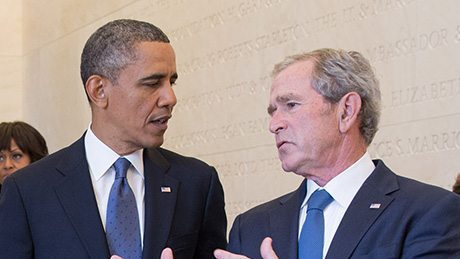
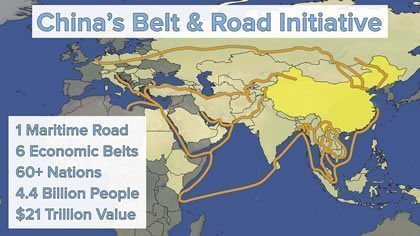 In the meantime, many of these proposals are in different phases of realization. There is the Maritime Silk Road, as you see on the maps. And China is building six overland economic corridors—as I said, it involves 70 nations, and over 30 international large organizations, 4.4 billion people, and trillions in investments. And as I said, already now it’s 12 times bigger than the Marshall Plan was.
In the meantime, many of these proposals are in different phases of realization. There is the Maritime Silk Road, as you see on the maps. And China is building six overland economic corridors—as I said, it involves 70 nations, and over 30 international large organizations, 4.4 billion people, and trillions in investments. And as I said, already now it’s 12 times bigger than the Marshall Plan was.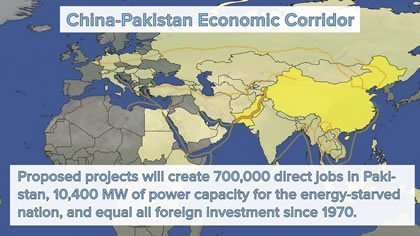 There is the new Eurasian Land-Bridge which connects China with Western Europe, and it has already shortened the transport time for cargo, to two to three weeks from China, to different cities—from Chengdu, Chongqing, and Yiwu, to Duisburg, Lyon, Rotterdam, and Hamburg, from five weeks via ocean. Already by mid-2016, there were over 2,000 rail shipments from China to Europe, and it is picking up speed. All the cities in Europe that are termini, such as Madrid, Lyon, Duisburg, they’re all happy; they realize that they have tremendous benefits from it.
There is the new Eurasian Land-Bridge which connects China with Western Europe, and it has already shortened the transport time for cargo, to two to three weeks from China, to different cities—from Chengdu, Chongqing, and Yiwu, to Duisburg, Lyon, Rotterdam, and Hamburg, from five weeks via ocean. Already by mid-2016, there were over 2,000 rail shipments from China to Europe, and it is picking up speed. All the cities in Europe that are termini, such as Madrid, Lyon, Duisburg, they’re all happy; they realize that they have tremendous benefits from it.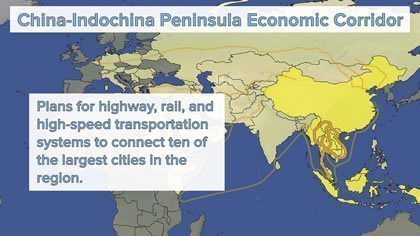 There is the China-Mongolia-Russia corridor. In June 2016, the three presidents signed a trilateral economic partnership, at the 11th Shanghai Cooperation Organization meeting; and this corridor alone involves 32 projects.
There is the China-Mongolia-Russia corridor. In June 2016, the three presidents signed a trilateral economic partnership, at the 11th Shanghai Cooperation Organization meeting; and this corridor alone involves 32 projects.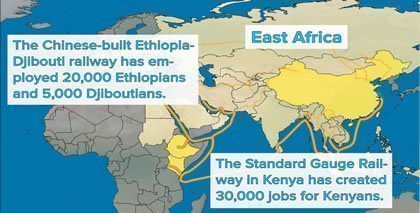 So, the Djibouti-Ethiopia railway just opened yesterday, so this is extremely good news. It opened yesterday, from Djibouti to Addis Ababa, 750 km, and it was built by China; it employed about 20,000 Ethiopians and 5,000 Djiboutians, and it will be connected to the standard gauge railway in Kenya, which again, created 30,000 jobs. And this will obviously, among other things, transform the port of Mombasa, and it will take cargo and passengers to the Ugandan border in one-tenth of the time it takes by road. A professor from the University of Nairobi School of Diplomacy, Prof. Gerishon Ikiara said, and I agree, that this whole program will “radically transform African participation in global trade in the next two decades and will catalyze the industrial transformation of Africa.”
So, the Djibouti-Ethiopia railway just opened yesterday, so this is extremely good news. It opened yesterday, from Djibouti to Addis Ababa, 750 km, and it was built by China; it employed about 20,000 Ethiopians and 5,000 Djiboutians, and it will be connected to the standard gauge railway in Kenya, which again, created 30,000 jobs. And this will obviously, among other things, transform the port of Mombasa, and it will take cargo and passengers to the Ugandan border in one-tenth of the time it takes by road. A professor from the University of Nairobi School of Diplomacy, Prof. Gerishon Ikiara said, and I agree, that this whole program will “radically transform African participation in global trade in the next two decades and will catalyze the industrial transformation of Africa.”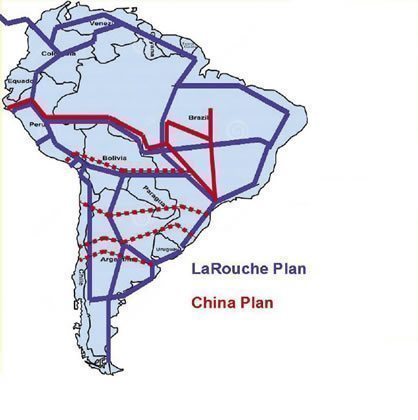
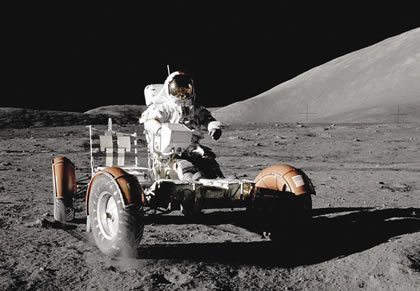 I don’t know if any of you have seen the latest pictures from the Hubble telescope: If you have not done that, please, go home and take the time to look at these pictures from the Hubble telescope. I saw them, and I was completely excited, because now we know that there are—at least—two trillion galaxies! Now, I have a good imagination, but I cannot imagine that. It’s just too big. And when you see the pictures which have already been taken, you have galaxies which look like the Milky Way; then you have totally different nebulas; you have all kinds of formations. And not one galaxy is like the other. Just imagine how big the Universe is!
I don’t know if any of you have seen the latest pictures from the Hubble telescope: If you have not done that, please, go home and take the time to look at these pictures from the Hubble telescope. I saw them, and I was completely excited, because now we know that there are—at least—two trillion galaxies! Now, I have a good imagination, but I cannot imagine that. It’s just too big. And when you see the pictures which have already been taken, you have galaxies which look like the Milky Way; then you have totally different nebulas; you have all kinds of formations. And not one galaxy is like the other. Just imagine how big the Universe is!